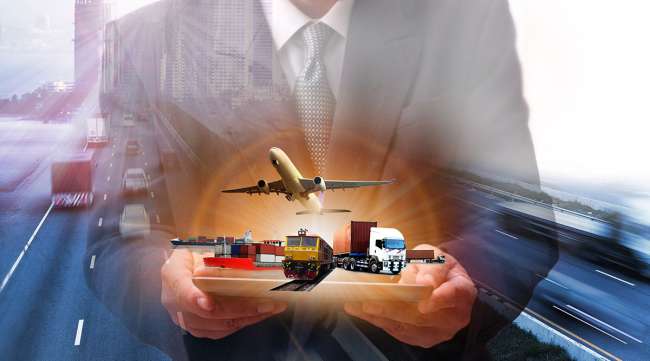Visions of the Future of Logistics

Survey: Most Significant Technologies
We also asked logistics companies, what is the most significant technology for your business? Here’s a sampling of survey responses:
American Global Logistics: Supply chain visibility.
Arrive Logistics: Automation, visibility, machine learning.
Atlantic Logistics: Autonomous trucks.
Allen Lund Co.: Transportation management system with live load tracking.
Blakeman Transportation: Dispatch automation and tracking.
Cardinal Logistics Management Corp.: Regulatory compliance.
Choptank Transport: Back-office efficiency, routing, tracking and blockchain.
Daycos Inc.: Business intelligence.
Des Moines Truck Brokers: Software integration, back office scraping and tracking systems.
DHL Supply Chain: Technology platforms that provide a comprehensive view of track and trace data, inventory, operational performance, reporting, etc., allowing customers to leverage data into business intelligence to enhance operations.
East Coast Transport: Visibility of available capacity in private carrier networks.
FW Logistics: Flexible space, flexible workforce.
Geodis Logistics: Robotics, inventory tracking and management, supply chain design and modeling tools.
GlobalTranz Enterprises: Artificial intelligence and predictive analytics.
Hub Group: Event recorders, truck platooning and autonomous vehicles, enterprise software and shipment visibility.
Ingram Micro Commerce & Lifecycle Services: Intelligent order management, routing and packaging, marketplace connectivity and labor optimization.
Integrity Express Logistics: Electronic logging devices.
ITS Logistics: Blockchain and quantum computing.
Kane Is Able Inc.: Real-time visibility to inventory, order status and on-time service performance.
Legacy Supply Chain Services: Visibility, business intelligence and customer relations management software.
Leonard’s Express: Temperature and location tracking.
LoadDelivered: Automation, artificial intelligence.
Logistics Plus Inc.: Business intelligence and blockchain.
MegaCorp Logistics: GPS tracking.
MIQ Logistics: Cyber security, tracking, artificial intelligence and blockchain.
Performance Team: E-commerce delivery systems.
Ryder Supply Chain Solutions: Robotics and warehouse automation, automatic identification, wearable and mobile technology and drones.
Ruan: Tracking.
Saddle Creek Logistics Services: Automation.
SPI International Transportation: Automated data entry, document collection, payment and tracking.
Total Quality Logistics: Predictive analytics.
Transervice Logistics: Telematics, vehicle automation and platooning and blockchain.
Transplace Inc.: Predictive analytics.
Transportation One: Automation, machine learning.
TransGroup Global Logistics: Automated shipment tracking.
Trinity Logistics: Freight tracking, transportation management software and blockchain.
Here's what some industry professionals had to say about what the future may hold:
________________________

Chuck Snow
"Eventually autonomous vehicles are going to be the big game changer, but in reality I really do not think that they are going to be the normal method of moving freight around within the next 10 years. A more immediate change will be going back to the old hub-and-spoke systems that were abandoned by full-load carriers with the onset of deregulation. Just-in-time inventory management works very well where you have an abundance of cheap labor. It totally collapses when you have a shortage of available trucks and drivers. I think companies are going to have to reconfigure their supply chains and allow for having more inventory on hand."
Chuck Snow, CEO, Traffix
________________________
"I am all for new advances in technology and automation. But you will never eliminate the human element."
Michael Monson, President, Top Talent Inc.
________________________

Mathew Elenjickal
"I see scenarios in which we will not need drivers. We’ll have better coordination with shippers. Deliveries will be more seamless and frictionless."
Mathew Elenjickal, CEO, FourKites
________________________

John Monarch
"Blockchain will help connect shippers and carriers directly, with more accountability, fewer intermediaries and reduced cost. This will be a massive shift in how we view the role of brokers."
John Monarch, CEO, ShipChain
________________________

Alain Kornhauser
"In terms of mobility, think about how there is no barrier to going up and down in any high-rise building. There’s no reason we can’t do that horizontally. With self-driving vehicles, we can go anywhere and we can have things delivered to us."
Alain Kornhauser, professor, operations research and financial engineering, Princeton University
________________________
"3D printing will be the next big technology phase to affect transportation and logistics. It should reduce the amount of trucks on the road as consumers will be able print ‘goods’ instead of going to a store to purchase."
John Millican, branch sales manager, Interstate Nationalease
________________________________________________

Dominie Garcia
"By 2040, many cities will have extensive fiber [optic] and broadband capabilities which will allow for extensive deployment of connected sensors. These sensors are already being used to detect traffic, enforce regulations on heavy-duty vehicles, monitor locations and movement of freight and provide routing information. Some of these new technologies can help mitigate long-standing issues around congestion, priority lane usage, urban freight challenges and other hurdles to increased effciency."
Dominie Garcia, Smart Cities program lead, Battelle
________________________________________________
"It’s very simple to me. Twenty years from now, handling and consolidation of loads will have to be minimized. Maybe shipper agents will reside on carrier docks to oversee loading and unloading of their freight."
Dalton Andrepont, former driver and supervisor

